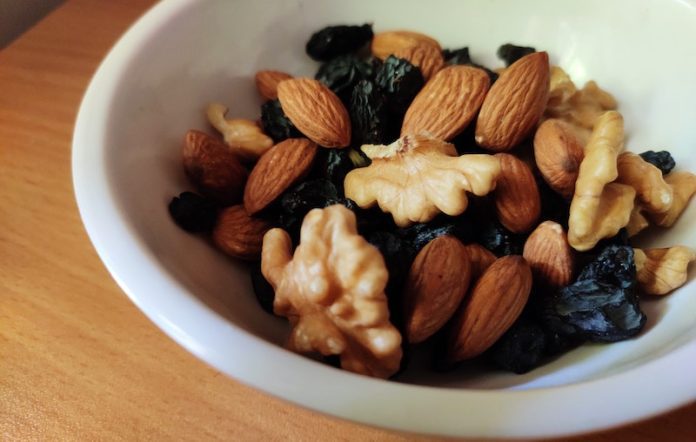
Scientists from Harvard University found that eating more nuts daily may help reduce weight gain and obesity risk in the long run.
Nuts are good sources of protein, healthy fats, fibers, vitamins, and minerals.
Nuts regulate body weight as their fats are not fully absorbed, they regulate food intake and help burn energy.
Nuts contain unsaturated fats and other nutrients that provide protective effects against heart disease.
Although eating nuts has become a trend in the US, how this habit affects weight gain and obesity risk is still unclear.
In this study, researchers aimed to test the link between eating different nuts (including peanuts) and long-term weight change.
They used data from three large long-term studies on health professionals in the US. A total of 27, 521 men, 61 680 older women, and 55 684 younger women were included. These people were free of chronic diseases.
The team focused on the link between nut consumption over 4 years and concurrent weight change over 20–24 years of follow-up.
They found that 21, 322 people had obesity at the end of follow-up. The average weight gain across the three groups was 0.32 kg each year.
Importantly, eating more nuts, per 0.5 servings/day (14 g), was strongly linked to less weight gain: −0.19 kg for general consumption of nuts, -0.37 kg for walnuts, and -0.36 kg for other tree nuts, and -0.15 kg for peanuts.
Eating more nuts, walnuts, and other tree nuts by 0.5 servings/day were linked to a lower risk of obesity. Eating more nuts was also linked to a lower risk of gaining body weight.
The researcher also found that replacing red meat, processed meat, French fries, desserts, potato, or chips (crisps) with 0.5 servings/day of nuts every day was linked to less weight gain.
These findings suggest that eating more nuts every day is linked to less long-term weight gain and a lower risk of obesity in adults.
Replacing 0.5 servings/day of less healthful foods with nuts may be a simple strategy to help prevent long-term weight gain and obesity.
One limitation of the study is that most of the people tested in the study were white health professionals with relatively higher socioeconomic status. Thus the results may not be applied to other populations.
The research is published in BMJ Nutrition, Prevention & Health and was conducted by Xiaoran Liu et al.
Copyright © 2022 Scientific Diet. All rights reserved.





